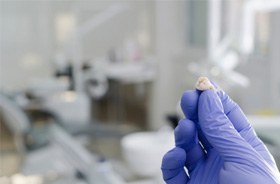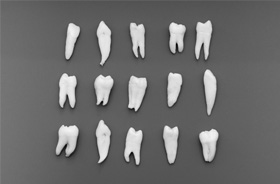
Tooth Extractions – Hamden, CT
Gentle Tooth Removal

In most cases, the team at New Haven Dental Group in Hamden is able to repair teeth that have developed damage or decay. Sometimes, though, the only viable treatment option is gentle tooth removal. When this happens, our team takes every step possible to keep a patient comfortable from the beginning to the end of the surgical procedure. We answer any and all questions beforehand and use plenty of local anesthetic. Afterward, we may be able to help a patient replace the tooth with a dental bridge or dental implant.
Why Choose New Haven Dental Group For Tooth Extractions?
- Sedation Dentistry Contributes to a Comfortable Experience
- Only Used After Other Treatment Options Have Been Considered
- Natural-Looking, Natural-Feeling Tooth Replacement Available
Reasons Why Tooth Extractions Are Necessary

Here are some reasons why we may determine that a tooth needs to be extracted:
- A tooth has a cavity that is too large to be repaired with a filling or crown.
- A tooth’s enamel is broken to the point where it cannot support a restoration.
- A serious infection, such as advanced gum disease, has weakened the bone supporting the tooth.
- A baby tooth is blocking the path of an incoming adult tooth.
- More room is needed in the mouth for either dentures or orthodontic treatment.
- A wisdom tooth is threatening a patient’s oral health.
The Process of Removing a Tooth

During a simple extraction, we use an instrument called an elevator to gently lift the tooth out of its socket. Then, we grip it with forceps, break the ligaments that are holding it in place, and remove it. We use gauze to control bleeding. During a surgical extraction, we take additional steps. For example, we may have to create incisions in the gums or break a tooth into pieces.
Whichever type of extraction you undergo, you can be confident that we will take steps to ensure your comfort throughout your procedure. Following your treatment, we will inform you of your tooth replacement options so you will not have to deal with the complications of an incomplete smile.
Tooth Extraction Aftercare

Here are some guidelines to help you enjoy a smooth recovery following your extraction:
- Take prescribed medications as directed by our team.
- After the first 24 hours, begin regularly rinsing your mouth with warm salt water.
- Do not spit vigorously.
- Do not use drinking straws.
- Do not smoke.
- Get plenty of rest, and prop your head up on pillows when you are lying down.
- Avoid strenuous physical exertion.
- Do not touch your extraction site with your fingers or tongue.
- Attend follow-up appointments with our team so we can replace your tooth in a timely manner. This can help you to avoid future tooth loss and other complications.
Understanding the Cost of Tooth Extractions

The cost of tooth extractions is affordable for most patients. However, the price can vary depending on several factors. During your consultation, we will provide you with detailed cost information. We will also be happy to help you explore your payment options, such as financing and insurance. Feel free to ask questions; we want the process of paying for your care to be as stress-free as possible.
Factors That Can Affect Tooth Extraction Cost

Some factors that can have a bearing on the cost of tooth extractions include:
- The specific tooth that needs to be removed. For example, wisdom teeth are usually more challenging to extract and come with higher fees than teeth located toward the front of the mouth.
- The number of teeth that need to be removed. It stands to reason that removing multiple teeth costs more than removing just one.
- The overall complexity of the case.We are able to perform most tooth extractions right here in our Woodbridge dental office. However, there are some complex cases that require us to refer patients to an outside specialist. Specialists have their own pricing structures and may charge more than a general dentistry office.
- Additional care. Sedation during your procedure, as well as tooth replacement afterward, can add significantly to your overall financial obligation. The cost of these services can vary widely depending on the circumstances.
Does Dental Insurance Cover Tooth Extractions?

It is very common for dental insurance to cover tooth extractions. Simple extractions are often classified as a minor service, so up to 80% of their cost may be covered. Surgical extractions, on the other hand, are usually designated as a major service. Only 50% or so of their cost may be covered. Our team will be happy to help you understand your insurance benefits and use them in the most advantageous way possible.
Other Options for Making Tooth Extractions Affordable

In addition to insurance, there are a couple of provisions that might make it easier for you to afford your extraction procedure:
- The Essential Dental Plan. In exchange for a reasonable fee, this discount plan offers reduced pricing on virtually all the services available in our office. It is ideal for patients without insurance.
- Financing.. If you would like to pay for your treatment over time, ask us how you can take advantage of CareCredit financing. Most patients are approved for a low-interest payment plan after a quick and easy application process.
Do you need to have one or more teeth removed? Our team is ready to help you with every aspect of your care, including its financial side. Get in touch with us today to learn more about how we may be able to serve you.
Tooth Extraction FAQs

The team at New Haven Dental Group in Hamden is ready to help you with all of your oral health needs. At some point, that might mean that we have to remove one of your teeth. We understand, though, that you may want more information about this procedure before you commit to it. To assist you, we have put together a brief list of tooth extraction FAQs, along with succinct answers. If your specific questions are not addressed here, please reach out to us directly.
Does Getting a Tooth Extracted Hurt?
We strive to make the treatment experience as easy as possible for our patients. To that end, we use local anesthetic to numb the mouth. If a patient is not easily numbed or is nervous about their procedure, we may be able to administer sedation as well. You can expect to feel little to nothing during your extraction appointment.
After any sedation and anesthesia wear off, your mouth will be sore. If you carefully follow post-op instructions, you can keep your discomfort to a minimum and support your body’s natural healing process. For example, you should eat soft foods and avoid smoking. Most patients are feeling back to normal within one week or so.
Is There an Alternative to a Tooth Extraction?
In some cases, it is possible to prevent a tooth extraction with root canal therapy, gum disease therapy, or other restorative procedures. You can increase your chances of keeping all of your teeth by regularly visiting your dentist and scheduling treatment as soon as it is recommended.
If a dental problem progresses far enough, extraction may be the only viable treatment option. If we recommend that one of your teeth be removed, you can be confident that we have already considered alternative procedures.
What Is the Difference Between Tooth Extractions and Wisdom Tooth Surgery?
The term “tooth extraction” can refer to the removal of any tooth in the mouth. Wisdom tooth surgery, also called wisdom tooth extractions, is exclusively for the third molars, which are located at the very back of the mouth.
Wisdom tooth extractions are often more complex than regular tooth extractions. That is because the wisdom teeth are often stuck beneath the gumline, so removing them can require that we make incisions in the gums or break the teeth into pieces.
What Are My Options for Replacing a Missing Tooth?
The three most popular types of tooth replacement are:
- Dental implants. An implant rebuilds a lost tooth from the root up. It is extremely sturdy, preserves the jawbone, and has the potential to last for many decades. Implants are considered the gold standard of tooth replacement.
- Fixed bridge. This type of restoration is supported by the remaining natural teeth. It can be aesthetically pleasing and provide several years of reliable function.
- Dentures. Dentures are removable prosthetics that are designed to replace multiple teeth. They are cost-effective and easy to care for.
Our team will recommend the form of tooth replacement that we believe best fits your circumstances.